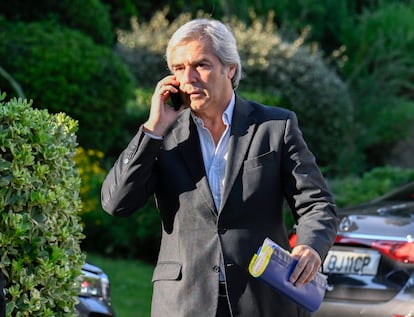Spanish border town of Olivenza remains oblivious to Portuguese minister’s claim over it
Portugal’s new chief of defense, the conservative Nuno Melo, has invoked a treaty from 1297 to argue that the municipality is ‘naturally Portuguese’


Nuno Melo, Portugal’s new defense minister, has revived an almost forgotten debate. “Olivenza is Portuguese, naturally, and this is not a provocation,” said Melo during a visit to the Portuguese town of Estremoz, near the border with Spain, on September 13. The minister was thus claiming sovereignty over a locality of 11,776 residents in the Spanish province of Badajoz, on the border between the two countries, on the basis of the Treaty of Alcañices, which dates back to 1297 and according to which the Portuguese State does not recognize Olivenza as Spanish territory.
The people of Olivenza are oblivious to the political controversy triggered by Melo, who belongs to the right-wing CDS-PP party. Relations between inhabitants on both sides of “La Raya” (The Stripe), as the Spanish-Portuguese border is informally known, remain normal. Many Spaniards go to work, shop and spend their leisure time in Portuguese towns and vice versa. And a European Union cross-border cooperation project is underway that includes Badajoz on the Spanish side and Elvas and Campo Mayor on the Portuguese side.
In Portugal, the minister’s statements have caused a stir. The leader of the Portuguese Socialist Party, Pedro Nuno Santos, rejected the defense minister’s remarks, which he has described as “extremely serious” and with “an impact on foreign policy”, especially on diplomatic relations with Spain. The controversy forced the minister to clarify that what he said was in a personal capacity, and that it was not an official opinion of the government of Portugal.
On the Spanish side, the mayor of Olivenza, Manuel José González Andrade, believes that the minister’s words are out of place, and that they belong more to the 19th century than to the 21st. “Both in form and substance, these statements are unacceptable. The people of Olivenza know their own history, which gives us a unique identity in the Iberian Peninsula,” he says, noting that the remarks are particularly serious because they were uttered by a minister, who “is not just anyone.” “Olivenza is the Iberian capital, we are a link between the two countries. We want to take advantage of the potential that history has given us,” González Andrade stresses.

Many residents of Olivenza with historical ties to Portugal have dual nationality and they are entitled to vote in elections in both countries. “Before Spain and Portugal became part of the European Union, there were no borders here, the only thing that separated us and still separates us is the Guadiana River,” explains Andrade, who is proud of his municipality’s Portuguese past. Currently, there are about 1,500 locals who speak Portuguese, mostly elderly people, although the younger generations have also benefited from measures to keep the language alive in the municipality.
Guillermo Fernández Vara, a former chief of the regional government of Extremadura, which includes Badajoz province, is himself a resident of Olivenza. He believes that in today’s world we must unite and not divide. “These are debates that could have existed years ago, but now they make no sense; the people of Olivenza feel very Spanish, very Extremaduran, but without renouncing their Portuguese history,” explains the former socialist leader. Fernández Vara stresses that what’s required in the current global context is a Europe that is as united as possible. “We Oliventinos are children of Spain and grandchildren of Portugal and we carry it in our souls; it is the past, present and future,” he says.
The current head of the regional government of Extremadura, María Guardiola, has also played down the issue. “It is a discussion that is not even on the table. Of course, Extremadura will continue to defend the Spanishness of its people,” she said, underscoring the “fantastic” relationship between the two countries. “In the last 30 years of cross-border cooperation, I believe that we have made more progress as European partners and brothers than in the last centuries,” she points out.
Spain gained Olivenza after the War of the Oranges against Portugal at the beginning of the 19th century, after returning Campo Maior and Portalegre, which had been conquered by the Spanish during the conflict. This is how the official chronicler of the city of Badajoz, Luis Alfonso Limpo, tells it. Olivenza had been “abandoned by the Portuguese army” and “no one died in its conquest,” the chronicler said in an interview on the radio network Cadena SER. Spain did not want to give up this strategic enclave on the left bank of the Guadiana River, whose foreign control could, due to its proximity, represent a danger for the city of Badajoz. King Charles IV’s favorite aide, Manuel Godoy — First Secretary of State of the Kingdom of Spain — guaranteed in the Treaty of Badajoz (1801) that Portugal would recognize Olivenza as Spanish.
From Portugal to Spain and back again
The Extremaduran town of Olivenza was founded in 1230 by Alfonso IX of León. The municipality belonged to this Spanish kingdom until 1297 with the signing of the Treaty of Alcañices, an agreement whereby Olivenza was ceded to Portugal. From that moment until the Portuguese Restoration War of 1640, the municipality was part of Portugal, but after the end of the conflict it was again recovered by the Spanish kingdom of Castile. It was handed over to Portugal again after signing the Treaty of Lisbon in 1668. During the War of the Oranges, in 1801, it was conquered by the troops of Manuel Godoy, and came under Spanish control until our days. This situation is considered unfair by Portugal's defense minister, who is a member of the executive of the conservative Luis Montenegro, in power since April.
Sign up for our weekly newsletter to get more English-language news coverage from EL PAÍS USA Edition
Tu suscripción se está usando en otro dispositivo
¿Quieres añadir otro usuario a tu suscripción?
Si continúas leyendo en este dispositivo, no se podrá leer en el otro.
FlechaTu suscripción se está usando en otro dispositivo y solo puedes acceder a EL PAÍS desde un dispositivo a la vez.
Si quieres compartir tu cuenta, cambia tu suscripción a la modalidad Premium, así podrás añadir otro usuario. Cada uno accederá con su propia cuenta de email, lo que os permitirá personalizar vuestra experiencia en EL PAÍS.
¿Tienes una suscripción de empresa? Accede aquí para contratar más cuentas.
En el caso de no saber quién está usando tu cuenta, te recomendamos cambiar tu contraseña aquí.
Si decides continuar compartiendo tu cuenta, este mensaje se mostrará en tu dispositivo y en el de la otra persona que está usando tu cuenta de forma indefinida, afectando a tu experiencia de lectura. Puedes consultar aquí los términos y condiciones de la suscripción digital.








































